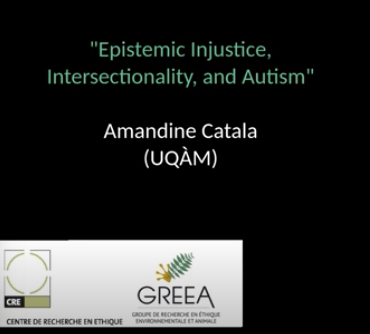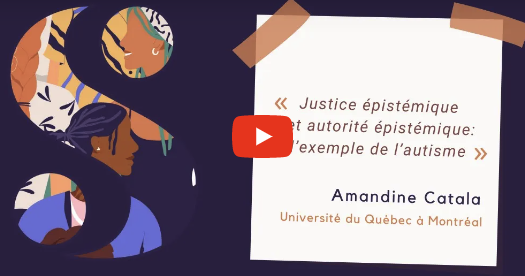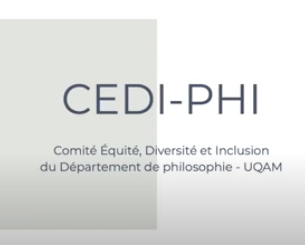Posts Tagged ‘video’
Epistemic Injustice, Intersectionality, and Autism
Epistemic Injustice, Intersectionality, and Autism
Speaker | Conférencière : Amandine Catala, UQAM
Organization | Organisation : CRÉ, GRÉEA
Event | Événement : "Speciesism & Other Discriminations | Spécisme et autres discriminations"
Panel 1: "Discrimination, Oppression & Intersectionality | Intersectionnalité"
Also available on | Également disponible sur : https://soundcloud.com/greea/amandine...
Abstract | Résumé
While the precise definitions of speciesism, racism, ableism, etc. are contentious, they are often considered forms of oppression and as indicators of structural inequality and injustice. This panel will seek to advance the debate by exploring a number of conceptual questions about oppression, structural injustice and discrimination, and the connections between them.
*** Bien que les définitions précises du spécisme, du racisme, du capacitisme, etc. soient controversées, elles présentent souvent ces phénomènes comme des formes d’oppression et des indicateurs d’inégalités et d’injustices structurelles. Cette table ronde cherchera à faire avancer le débat en explorant un certain nombre de questions conceptuelles sur l’oppression, l’injustice structurelle et la discrimination, et les liens qui existent entre elles.
Epistemic justice and epistemic authority: the example of autism
Lecture by Professor Amandine Catala, “Epistemic justice and epistemic authority: the example of autism”, as part of the Summer Seminar for Diversity in Philosophy.
Conference summary Autistic people often face multiple forms of epistemic injustice in many contexts, whether medical, clinical, familial, social, professional or academic. Epistemic injustice often undermines the epistemic authority that autistic people have about their own experience of themselves and the world. In this presentation, I identify and defend criteria that justify epistemic authority about autism and cultivate greater epistemic justice for autistic people. This process of identifying criteria proves useful not only for autism but also for other axes of intersectionality and social identity, such as gender, racialization, disability, etc.
Speaker’s biography Amandine Catala is Associate Professor in the Department of Philosophy at the Université du Québec à Montréal, where she holds the Canada Research Chair in Epistemic Injustice and Agency. Her research in social, political and feminist philosophy focuses on epistemic injustice and agency in relation to issues such as the under-representation of certain groups in certain fields, colonialism, public deliberation, think tanks, linguistic justice, disability and neurodiversity. Amandine Catala received her PhD in philosophy from the University of Colorado at Boulder, and has completed internships and postdoctoral fellowships at the London School of Economics, the Australian National University, and the Université de Louvain.
Version with LSQ interpretation:
Presentation of the Equity, Diversity and Inclusion Committee of the Philosophy Department at UQAM
Epistemic justice and epistemic authority on autism. Philosophy of Psychiatry Webinar
Abstract:
Autistic people often face multiple forms of epistemic injustice in many contexts, whether medical, clinical, familial, social, professional, or academic. Epistemic injustice often undermines autistic people’s epistemic authority regarding their own experience of themselves and of the world. In this talk, I identify and argue for criteria that justify epistemic authority on autism and that foster greater epistemic justice for autistic people.



